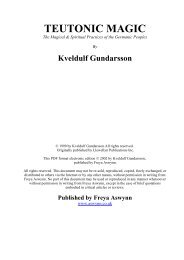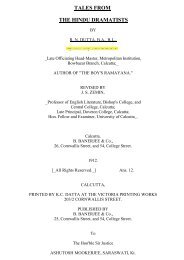Untitled - Awaken Video
Untitled - Awaken Video
Untitled - Awaken Video
You also want an ePaper? Increase the reach of your titles
YUMPU automatically turns print PDFs into web optimized ePapers that Google loves.
Chapter 6. The Sky 153<br />
Neither the Gods nor men appeared to be overly concerned about the future.<br />
Man’s destiny was to go to the Land of his Ancestors and, as a consequence, take<br />
up that role which funnels power/ luck back towards the family of the living and<br />
helps descendants make their way through life. The Gods, on the other hand, knew<br />
what lay in the future as an inevitability or, as stated in Chapter 2, which “lineages<br />
were on a collision course with another,” but could only deal with the here-and-now<br />
to help push it further forward into the future by working with the inhabitants of<br />
Midgard to generate ¸orlög and keep the Flow of the Waters of Life in harmony with<br />
the needs of the World Tree. The question “Where am I going to go after death?”<br />
does not ever come up in the eddaic or sagaic literature because each knew already,<br />
long before he died, his final destination. The question of uncertainty was and still<br />
is a Christian phenomenon not a Heathen one.<br />
Judgement, after death, by the Gods is unnecessary in the Germanic worldview<br />
and did not form part of the Heathen religion as far as can be ascertained. This is<br />
also primarily a Christian concept. Sagaic and eddaic literature has many references<br />
to revenge being exacted on living men by the Gods, but this is for breaking a taboo<br />
associated with a particular God. Glum in Viga-Glum’s Saga does not have a good<br />
relationship with Frey although He was the patron God of his community.<br />
“Throughout his adult career Glum was on bad terms with the God Freyr.<br />
To begin with, he slew an enemy on the cornfield, Vitazgjafi, and thus defiled<br />
it. The father of this man had no legal case, and was expelled from the<br />
district. Before he left, he brought an ox to Freyr’s temple. The beast<br />
bellowed and fell dead, showing that the God had accepted the sacrifice and<br />
would repay it.<br />
“Glum’s relations with Freyr grew worse as time wore on. He concealed his<br />
outlaw son, Vigfuss, within the sacred precincts of the temple. He emulated<br />
Óðínn in swearing an ambiguous oath in three temples, one of which was the<br />
temple of Freyr. Afterwards he had a strange dream. He saw Freyr sitting<br />
on a chair on the bank of the river, where many had come to visit Him.<br />
These were his dead kinsmen, who had come to intercede with the God on<br />
his behalf. But Freyr answered abruptly and angrily, remembering the ox<br />
which Glum’s enemy had given Him. . . .He could no longer withstand his<br />
enemies, and was driven from his lands in disgrace.” 16<br />
Judgement, by the Gods, was exacted on the living, however, and not the dead. The<br />
above is one of many cases from the sagaic literature although the other cases are<br />
not so clearly delineated nor so well described as this one. The form that revenge<br />
16 Turville-Petre, p. 70.
















